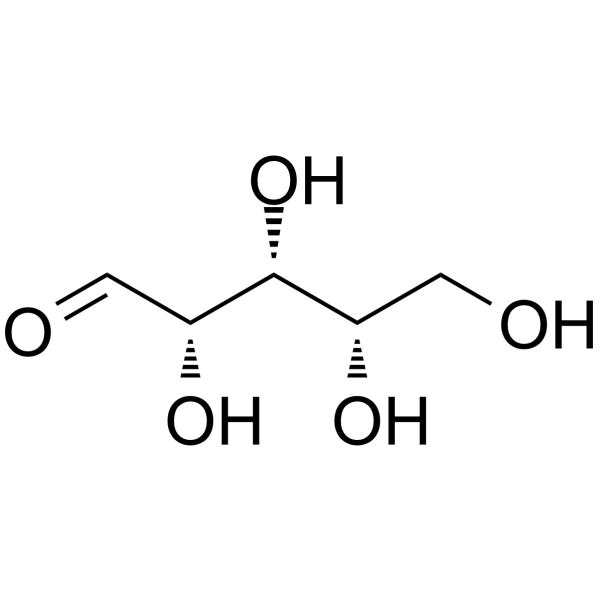
L-Xylose
CAS No. 609-06-3
L-Xylose( L-(-)-Xylose )
Catalog No. M26735 CAS No. 609-06-3
L-Xylose, a Xylose levo-isomer, is classified as the aldopentose type?monosaccharide.
Purity : >98% (HPLC)
 COA
COA
 Datasheet
Datasheet
 HNMR
HNMR
 HPLC
HPLC
 MSDS
MSDS
 Handing Instructions
Handing Instructions
| Size | Price / USD | Stock | Quantity |
| 100MG | 26 | In Stock |


|
| 500MG | 58 | In Stock |


|
| 1G | Get Quote | In Stock |


|
Biological Information
-
Product NameL-Xylose
-
NoteResearch use only, not for human use.
-
Brief DescriptionL-Xylose, a Xylose levo-isomer, is classified as the aldopentose type?monosaccharide.
-
DescriptionL-Xylose, a Xylose levo-isomer, is classified as the aldopentose type?monosaccharide.(In Vitro):The permeability characteristics of L-xylose have been compared in isolated intact rat diaphragm muscle preparations, in the absence and presence of exogenous insulin. In the absence of added insulin, L-xylose distributed in less than a third of the total cell water. In the presence of added insulin, intracellular distribution of L-xylose is increased. L-Xylose distributed in 50 per cent of the intracellular water. A significant lag period was observed before the insulin effect upon the penetration of L-xylose was evident. The lag period with L-xylose could be abolished by pretreating the tissues with insulin for 1 hour.
-
In Vitro——
-
In Vivo——
-
SynonymsL-(-)-Xylose
-
PathwayOthers
-
TargetOther Targets
-
Recptor——
-
Research Area——
-
Indication——
Chemical Information
-
CAS Number609-06-3
-
Formula Weight150.13
-
Molecular FormulaC5H10O5
-
Purity>98% (HPLC)
-
SolubilityIn Vitro:?DMSO : 100 mg/mL (666.09 mM)
-
SMILESOC[C@H](O)[C@@H](O)[C@H](O)C=O
-
Chemical Name——
Shipping & Storage Information
-
Storage(-20℃)
-
ShippingWith Ice Pack
-
Stability≥ 2 years
Reference
1.Thomaston JL, et al. Crystal structure of the drug-resistant S31N influenza M2 proton channel. Protein Sci. 2016 Aug;25(8):1551-4.
molnova catalog



related products
-
Hydroxy-PEG10-acid
Hydroxy-PEG10-acid is a PEG-based PROTAC linker that can be used to synthesize PROTACs.
-
Fructoheptasaccharid...
Fructoheptasaccharide belongs to fructooligosaccharides (FOS) with degree of polymerization (DP=7).
-
CNP (1-22), human
C-Type Natriuretic Peptide (CNP) (1-22), human is the 1-22 fragment of C-Type Natriuretic Peptide.



 Cart
Cart
 sales@molnova.com
sales@molnova.com


